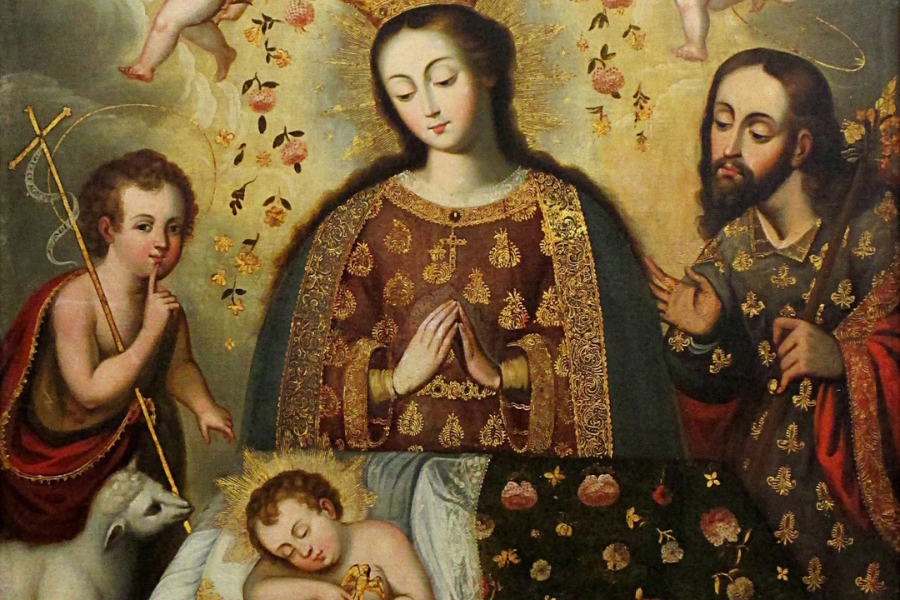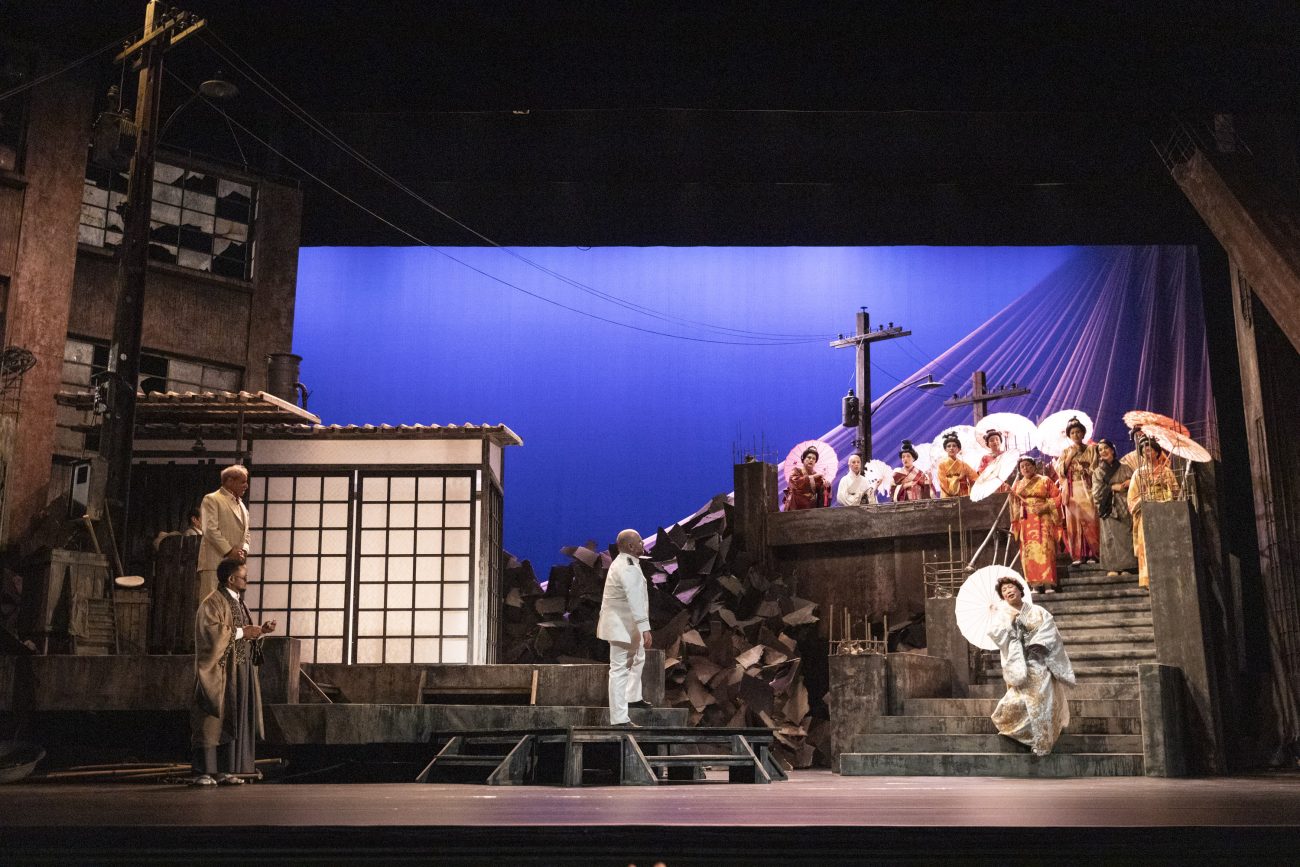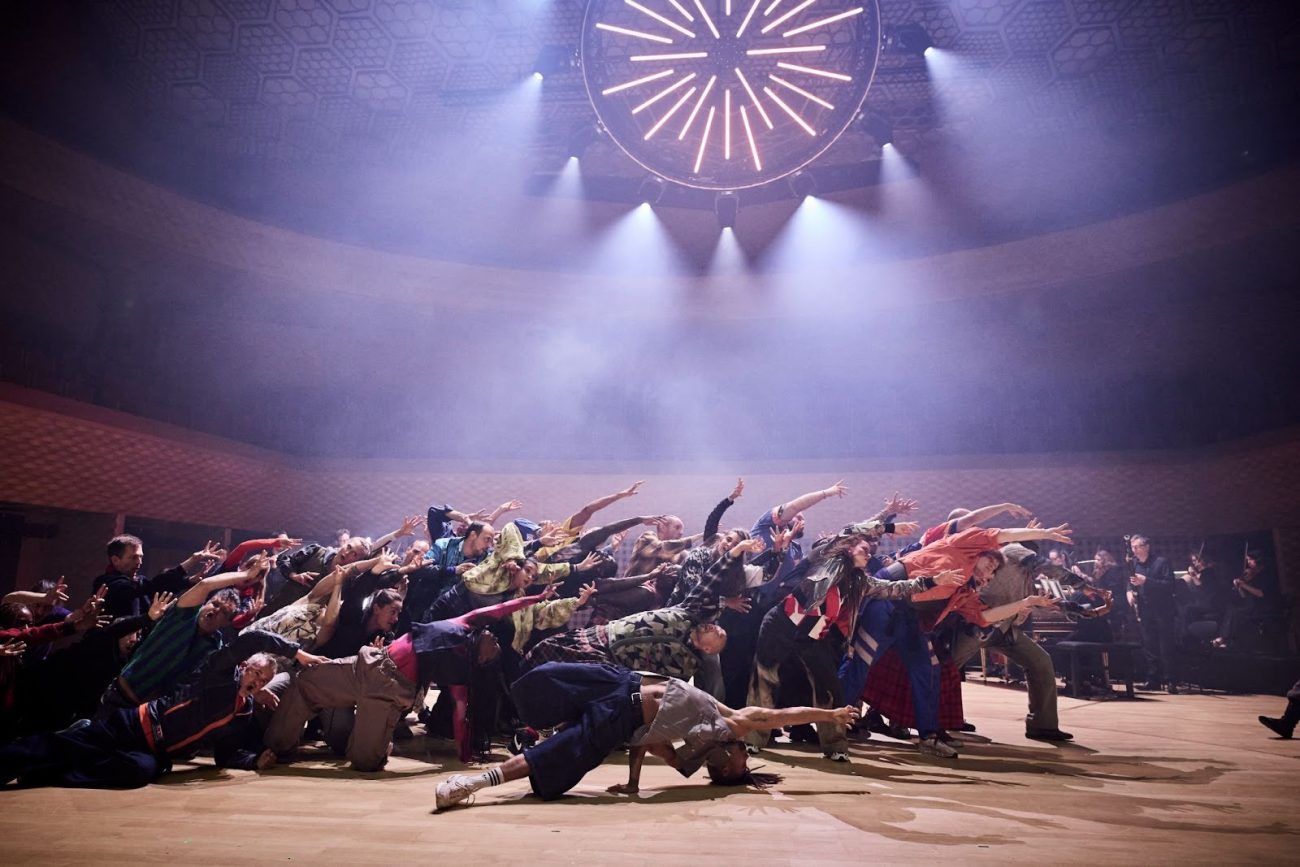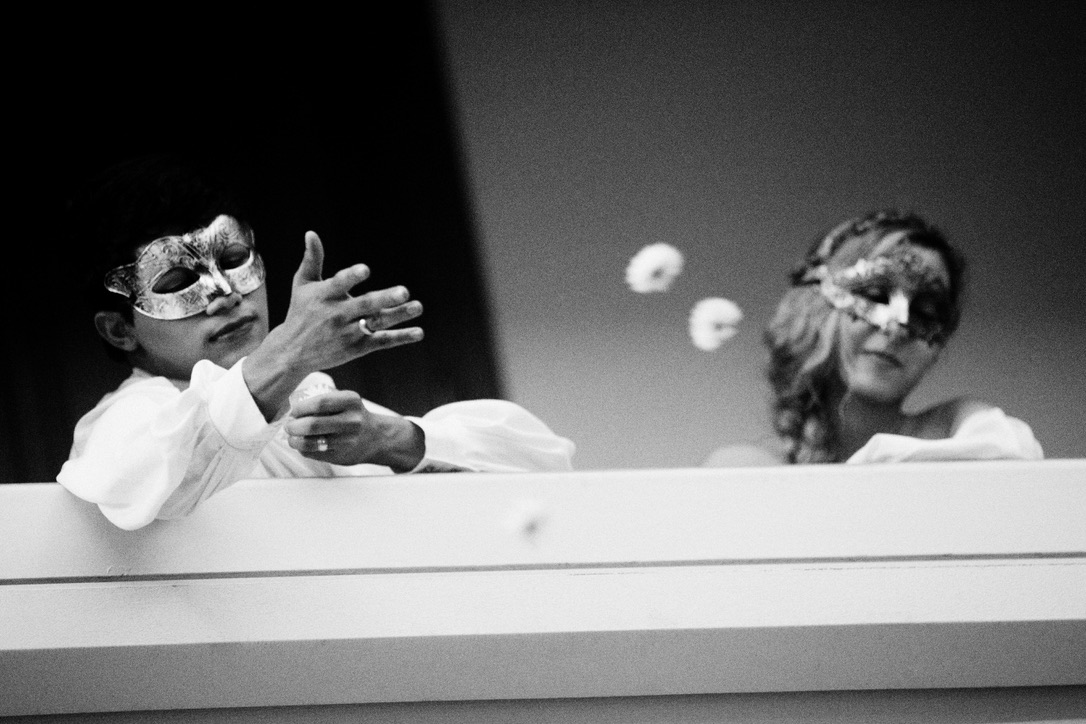Sebastián Errázuriz, compositor: «Asumo la ópera como un género que habita en el teatro y no en el museo»
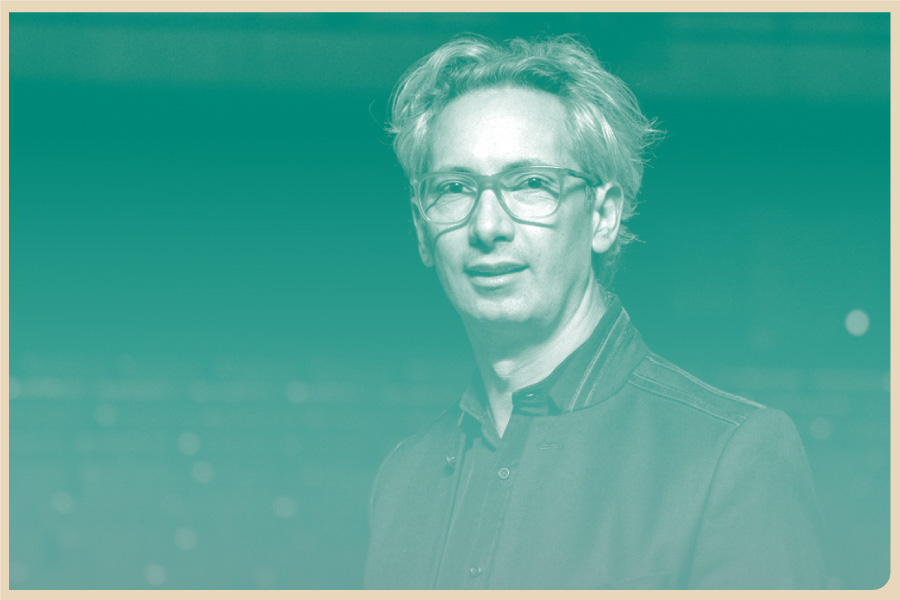
La primera vez que el compositor chileno Sebastián Errázuriz vio una ópera en el Municipal de Santiago sintió que ahí sucedía «todo lo que realmente me interesa»: la idea de obra de arte total. La ópera Patagonia, con puesta en escena de Marcelo Lombardero y coproducida por el Teatro Biobío y el Teatro del Lago, es la composición más reciente de Errázuriz; una mirada americanista del viaje de Hernando de Magallanes y el encuentro con la cultura aonikenk o tehuelche. En esta entrevista para Ópera Latinoamérica, Sebastián Errázuriz ahonda, entre otros temas, en sus primeros recuerdos musicales, el proceso de creación de Patagonia y los alcances de la sustentabilidad y sostenibilidad en la producción de ópera.
por Álvaro Molina R.
En la ópera Patagonia, la más reciente obra musical del compositor chileno Sebastián Errázuriz (1975), la historia se cuenta en dos tiempos, un ejercicio dramático que junta retazos de memoria oral y hechos que hace 500 años marcaron el rumbo de la humanidad. Es una ópera que visita la historia.
Según Errázuriz, la ópera, que relata en parte la travesía de Hernando de Magallanes hacia las Indias Orientales y su encuentro con la cultura aonikenk, narra una epopeya antigua, pero que plantea un problema actual. “¿Cómo reconocemos el territorio que habitamos en el sur del mundo? ¿Quiénes somos? ¿Cómo nos hemos relacionado con los habitantes originarios y con la naturaleza?”, son las preguntas que, de acuerdon con el compositor, atraviesan el relato de la ópera.
Patagonia es el resultado de la colaboración artística entre Errázuriz y el director de escena argentino Marcelo Lombardero y de una coproducción entre el Teatro Biobío y el Teatro del Lago -junto a la colaboración de Orquesta de Cámara de Valdivia-, todas emplazadas en la zona sur de Chile. La ópera también nació bajo el concepto de ópera pospandemia, con un proceso de creación y escritura que se vio enfrentado a las restricciones de la crisis del coronavirus.
“Mientras avanzábamos en la escritura del proyecto, empezó la pandemia. De pronto nos dimos cuenta de que la ópera, como género de grandes proporciones (y muy costosas), iba a tardar mucho en volver a la normalidad. Tanto por temas sanitarios como de presupuestos, a la ópera le costará regresar a los escenarios. Así surgió la idea de ópera pospandemia”, explica Sebastián Errázuriz. El proyecto de Patagonia contó, además, con el apoyo de un Fondo Iberescena y un Fondart Nacional.
El compositor chileno, quien antes de entrar a estudiar composición tuvo la idea de formarse como guitarrista de jazz, admite que hoy se encuentra más interesado en los problemas éticos que los estéticos: “¿Para quién trabajo? ¿Por qué hago lo que hago? ¿Cómo puedo decir esto o aquello con la mayor honestidad posible?”. En un mundo que intenta transitar hacia el cumplimiento de objetivos de desarrollo sostenible, la ópera, según Errázuriz, tiene que reinventarse en el marco de las problemáticas de hoy.
En esta entrevista exclusiva para Ópera Latinoamérica, el compositor chileno relata qué sintió cuando vio por primera vez una ópera en el Municipal de Santiago y cómo se cautivó con la idea de la obra de arte total. Desde ahí, nos cuenta sus distintas visiones con respecto a la ópera como un género que pueda hablarle al mundo de hoy, los anhelos de los compositores latinoamericanos y por qué dentro de su estética conviven figuras como Stravinsky, el cantautor Luis Alberto Spinetta y el guitarrista de jazz Pat Metheny, entre otros.
“La idea de la obra de arte total es posible”
¿Cuál es tu primer recuerdo con la música? ¿Cómo te acercaste a ella? ¿Hubo alguna persona en especial que te mostró este mundo?
Participando en el coro del colegio. De grande me he dado cuenta de que siempre busqué la manera de acercarme a la música. Desde muy chico busqué instancias para estar cerca de ella. Copiando casetes de mis hermanos grandes, buscando instrumentos, con mis vecinos músicos. En fin, a pesar de no venir de familia de músicos, siempre estuve buscando la manera de estar cerca, de aprender, escuchar, tocar, cantar. Mi primer mentor relevante fue mi profesor de música desde 5º básico. Claudio de la Melena, un ser muy iluminado que me transmitió la pasión desinteresada por la música y su entorno. A él le dediqué Música Fúnebre, una de mis primeras obras para orquesta de cuerdas tras su trágica muerte.
¿Recuerdas la primera vez que fuiste a un teatro? ¿Puedes describir el ambiente o lo que sentiste en ese momento?
El primer recuerdo marcador fue una salida de curso a ver El violinista en el Tejado en el Teatro Nacional. Fue una experiencia muy estimulante. Ya bastante mayor fui a ver ópera al Municipal de Santiago. Me voló la cabeza y pensé “acá sucede todo lo que realmente me interesa”: teatro, música, diseño, dramaturgia, poesía, orquesta. La idea de la obra de arte total es posible.
¿Cómo fue tu debut en la composición? ¿Dónde fue? ¿Puedes describir ese momento?
Cuando me decidí por dedicarme profesionalmente a la música, yo venía con la idea de ser un guitarrista de jazz. Al elegir la carrera, decidí entrar a composición por la idea de tener una formación más amplia. Al empezar las clases con el maestro Guillermo Rifo en la Escuela Moderna me fui dando cuenta de lo fluido que me resultaba. Las tareas cobraban sentido y poco a poco se iba definiendo un camino propio.
En 1997, mientras trabajaba en una orquesta latina en Mónaco, me decidí a probar unas ideas con los instrumentistas que me acompañaban. En el camarín organicé un ensayo y me encontré con esa fascinación de sentir que las ideas puestas en un papel cobraban vida. Ahí no paré más. Siempre escribiendo para los grupos que estuvieran dispuestos a regalarme un momento de sus ensayos.
¿Cuál es tu aproximación estética a la composición musical? ¿Qué influencias reconoces en tu música? ¿De dónde vienen?
Mi aproximación estética es profundamente ecléctica. Me interesa tanto Stravinsky como Bill Evans, Pat Metheny, Shostakovich y Luis Alberto Spinetta. Estos últimos años he llegado al convencimiento que me interesan mucho más los problemas éticos que los problemas estéticos. ¿Para quién trabajo? ¿Por qué hago lo que hago? ¿Cómo puedo decir esto o aquello con la mayor honestidad posible?
Tu obra lírica, en general, toma temas bastante contemporáneos, por ejemplo, Viento blanco o Gloria. ¿Qué hay tras esa búsqueda? ¿Por qué decides abordar esos temas desde la ópera?
Asumo la ópera como un género que habita en el teatro, y no en el museo. El teatro ha sido la gran escuela de la humanidad. Me refiero al teatro como una manifestación viva que nos observa, nos interpela y nos muestra lo peor y lo mejor de la sociedad que habitamos, versus el museo que es algo que nos habla del pasado. Entonces, al buscar un tema de ópera, se me hace un requisito esencial el que pueda hablarle al mundo de hoy.
En la Patagonia
Ahora, sobre la ópera Patagonia, que rescata el viaje de Magallanes desde la perspectiva americanista. ¿Qué rol tiene el arte en la visita a la historia? ¿Qué querían provocar o comunicar a los públicos?
Estamos contando esta historia que sucedió hace 500 años desde hoy. Por eso es clave el personaje de Ikalemen, una mujer contemporánea que está reconociéndose como heredera de la cultura aonikenk. Es ella quien, juntando retazos de la memoria oral de su pueblo va cruzando esta información con la de los libros de historia. Por lo tanto, a pesar de estar narrando una epopeya antigua, estamos planteándonos un problema actual. ¿Cómo reconocemos el territorio que habitamos en el sur del mundo? ¿Quiénes somos? ¿Cómo nos hemos relacionado con los habitantes originarios y con la naturaleza?
En Patagonia, el personaje de Xorenken tiene un libreto completamente en lengua aonikenk. ¿Cómo fue el proceso de construir ese libreto y, en cierto sentido, rescatar esa lengua?
Uno de los grandes desafíos (y dilemas éticos) que tuvimos en el proceso de construcción del libreto, fue cómo justificamos dramatúrgicamente la manera en que las mujeres aonikenk se comunican entre ellas y con Juan de Cartagena. Hacerlas cantar en castellano era negarlas culturalmente: ¡un problema ético! Nuestras primeras averiguaciones hablaban del tehuelche como una lengua extinta.
Escribí algunos primeros intentos con palabras sueltas encontradas en algunos diccionarios de Tehuelche. Tras varias semanas navegando en la web intentando encontrar más información di con el trabajo del antropólogo lingüista Javier Domingo.
Le escribí contándole el proyecto y pidiendo su ayuda para poder obtener unos textos coherentes en aonikenk. Él me hizo saber que existía un grupo organizado de Tehuelches que estaban rescatando su idioma inspirado por Dora Manchado, la última hablante nativa que había muerto el año 2019. Nos puso en contacto y ellos se transformaron en nuestros interlocutores. Los textos que canta Xorenken son retazos de frases dichas por Dora Manchado en sus conversaciones con el antropólogo.
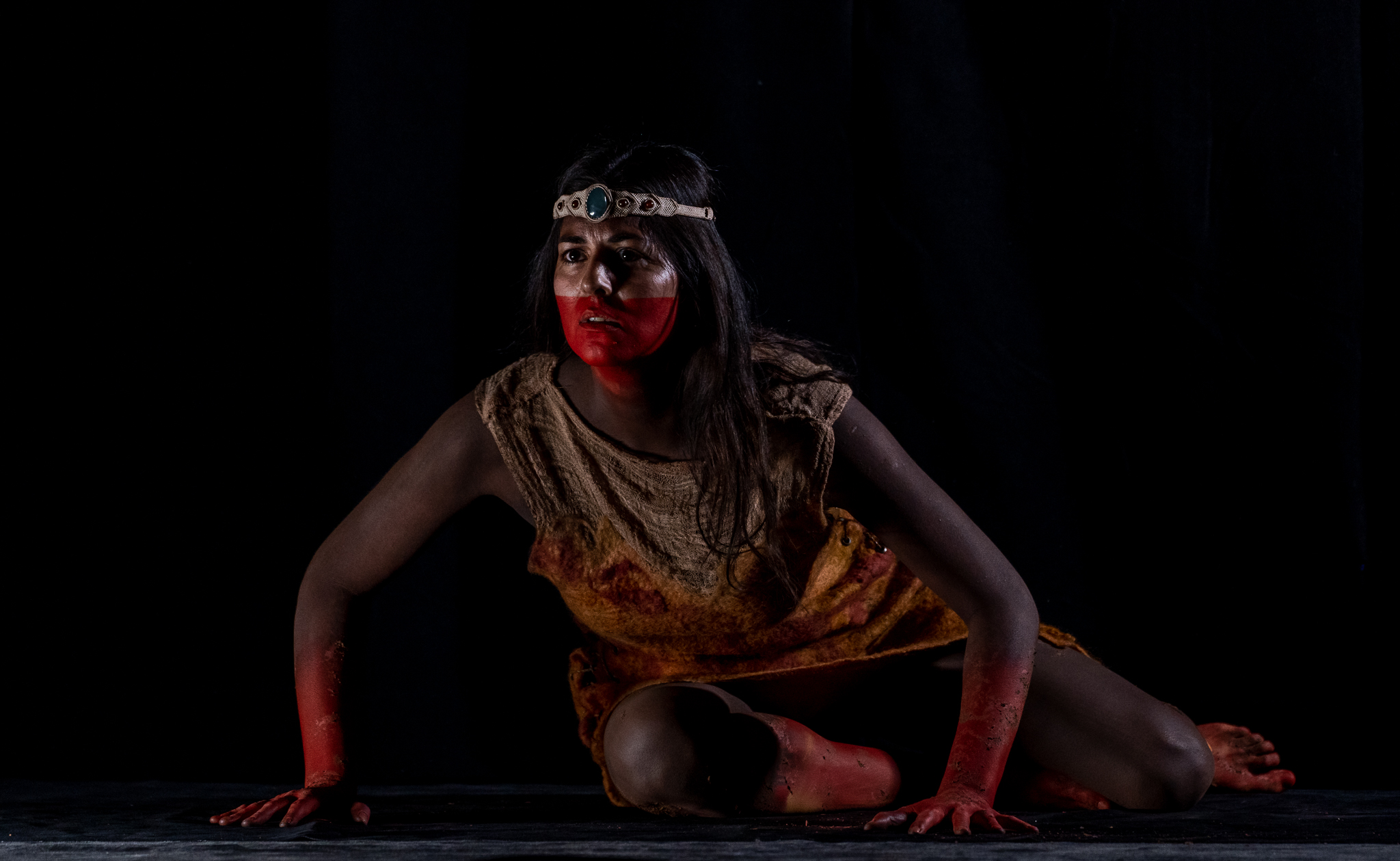
La soprano Marcela González encarna al personaje de Xorenken en la ópera «Patagonia». Foto: Teatro del Lago.
Se denomina a Patagonia como una ópera pospandemia. ¿En qué sentido lo es? ¿Qué beneficios tiene crear óperas de esta envergadura?
Mientras avanzábamos en la escritura del proyecto, empezó la pandemia. De pronto nos dimos cuenta de que la ópera, como género de grandes proporciones (y muy costosas), iba a tardar mucho en volver a la normalidad. Tanto por temas sanitarios como de presupuestos, a la ópera le costará regresar a los escenarios. Así surgió la idea de ópera pospandemia.
Así como en tiempos de crisis nacieron obras de pequeño presupuesto como la Historia del Soldado de Stravinsky, o el Oratorio en tiempos de Händel fue la alternativa a los grandes gastos de la ópera, se nos presentó como una oportunidad el pensar en un elenco y una envergadura abordables en tiempos de crisis. El elenco y la orquestación fueron pensados como síntesis que permitiera dar la sensación imponente de la ópera al mismo tiempo de la intimidad del teatro de palabra. Para conservar la premisa de que la ópera es interdisciplina, nos quedamos en escena con 4 cantantes, más una actriz, un bailarín y un percusionista.
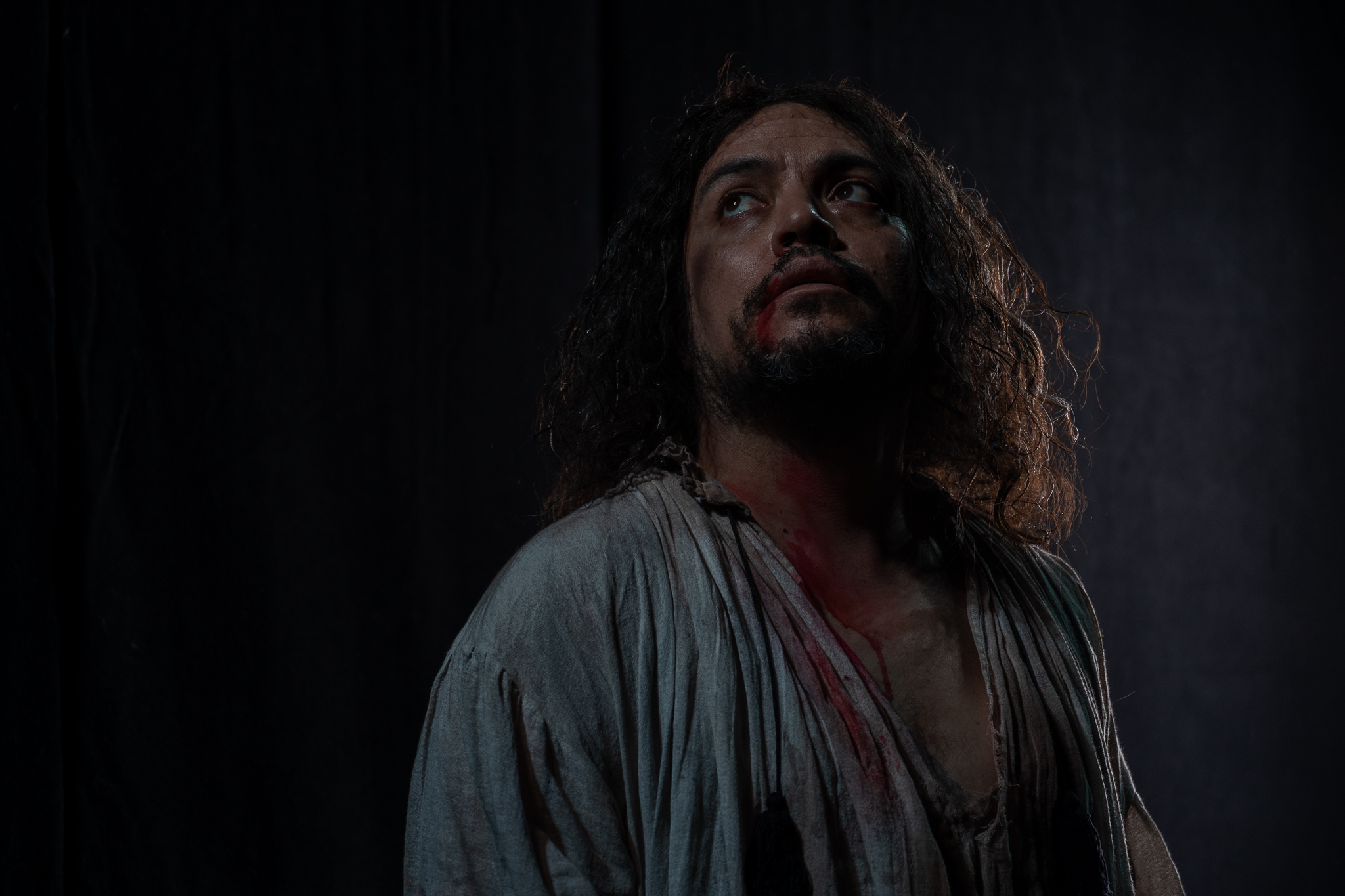
En la ópera Patagonia, el bajo barítono Sergio Gallardo interpreta a Juan de Cartagena, Juan de Cartagena, representante del rey Carlos V. Foto: Teatro del Lago.
¿Cómo definiste la orquestación de Patagonia, tanto en términos dramáticos como musicales? En la misma línea, ¿cómo definiste las voces para la ópera?
La conformación instrumental de Patagonia es un traje a la medida de la Orquesta de Cámara de Valdivia, agrupación que creyó en el proyecto desde su génesis. Es la gracia de la creación para elencos predeterminados. El compositor se ajusta a lo que tiene a su disposición. Una vez que tuvimos claridad sobre los personajes y sus respectivos viajes internos, fue bastante fácil decidir qué voces usar.
Cuando el arco dramático está bien definido generalmente la decisión de tesituras y tipos de voces cae por su propio peso. Además, trabajando codo a codo con Marcelo Lombardero, las decisiones musicales siempre fueron gatilladas por sus agudas reflexiones sobre dramaturgia y puesta en escena. Es un lujo trabajar con un director de escena que fue un cantante lírico de trayectoria además de poseedor de una cultura y reflexión amplia. Una de sus frases de ensayo quedará para siempre en mi memoria: “los problemas musicales son siempre problemas dramáticos”
¿En qué se diferencia el sonido o la estética musical de Patagonia con respecto a tus composiciones y/u óperas anteriores?
Hay mucho del lenguaje armónico que vengo desarrollando hace años, en donde la orquesta suele cumplir con un rol muy incidental y descriptivo sobre lo que sucede en escena. Al mismo tiempo la concepción melódica busca devolverles a los cantantes un dibujo y fraseo expresivo que viene de la tradición operática. Esa línea de canto que durante el siglo XX se vio un poco extraviada por las tendencias militantes de las vanguardias.
Ópera para el mundo de hoy
Hoy se discute sobre cómo llevar a cabo producciones de ópera de forma sustentable y sostenible, sobre todo en el marco de un mundo en crisis. ¿Qué dirección deberían tomar las producciones para cumplir con objetivos sostenibles?
El problema de la sostenibilidad y sustentabilidad de la ópera como expresión dramática contemporánea es algo que me vengo planteando hace varios proyectos. Tanto Gloria, como Papelucho y Anticantata fueron óperas de cámara que nacieron desde esa pregunta y con la idea de fundar una compañía que pueda ofrecer a los teatros espectáculos de alta calidad con presupuestos acotados.
Espero que podamos llevar Patagonia a muchos teatros del mundo y así revitalizar este género que peligra extinguirse si no logra reinventarse. Estamos muy orgullosos de la ampliación de públicos que hemos aportado con estas obras que apelan al ciudadano de hoy.
¿Te gustaría presentar alguna obra en un teatro en particular? ¿Cuál y por qué?
Quisiera presentar Patagonia en al menos los lugares que tuvieron que ver con la expedición de Magallanes: Sevilla, Portugal, Italia, Brasil, Argentina y Chile. La puesta en escena que diseñó Noeia González Svoboda de Teatro Musical Contemporáneo fue pensada para ajustarse de manera muy versátil a las distintas realidades de los teatros de Latinoamérica. Nos importa llegar al mayor público posible y generar ese espacio de reflexión y debate.
Anhelo que los creadores contemporáneos podamos tener más espacios en nuestros teatros de ópera. Que los programadores se atrevan a pensar fuera de la caja y nos comisionen nuevas obras que permitan el desarrollo de una tradición de teatro cantado en castellano.
¿Tienes otros proyectos futuros en mente? ¿Puedes adelantarnos algo?
Vengo saliendo de 5 años de arduo trabajo para estrenar Patagonia. Estoy en ese período posparto que hay que tomar con calma. Ideas nuevas siempre tengo…. Lo que falta son los teatros y programadores que quieran apostar por ellas.


